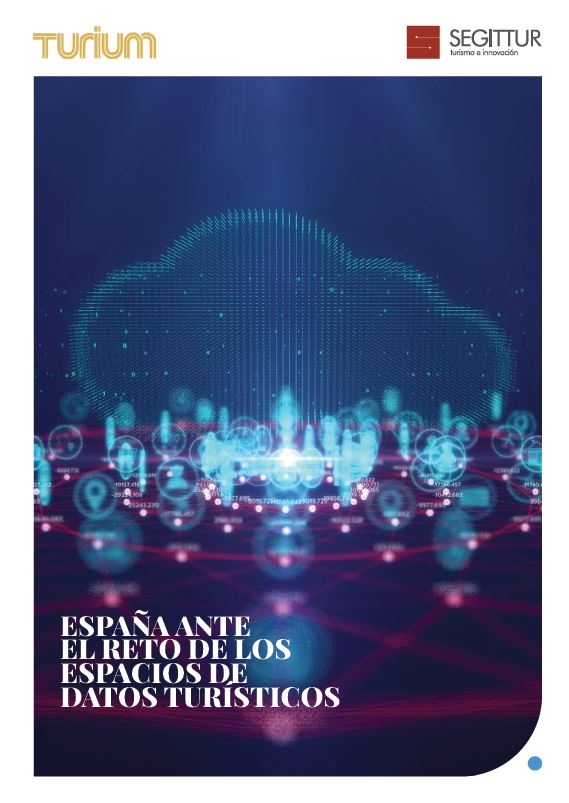Keys for Data Exchange in Tourism: the Role of Data Spaces

Keys for Data Exchange in Tourism: the Role of Data Spaces
- Data spaces are environments for the voluntary and secure exchange of data. They will be the basis for sharing data resulting from the interaction between tourist, destination and tourism company.
- Segittur and Turium have presented the report "Spain and the challenge of tourism data spaces", which delves into the value of data spaces for data providers and destination managers.
Tourism statistics are facing an emerging scenario in which the interactions between tourists, destinations and tourism companies are gaining ground as a source of information with high added value.
The digitalisation of the sector and the destination, the implementation of sensors, the application of artificial intelligence and the management of Big Data are crucial in generating this data. The exchange and management of this data must guarantee its governance and sovereignty. Here, the development of data spaces plays a critical role. These are federated data sharing schemes in which each provider defines the security levels that correspond to its information and the relationship with the other stakeholders.
The European digital strategy is working on a regulatory framework that will make it possible to develop these data spaces. It focuses on the creation of an exchange ecosystem that focuses on industrial sectors and democratises access to data for all players in each sector.
Keys for universal access to data exchange in tourism
One of the goals of the development of data spaces is the democratisation of data exchange in a voluntary, secure way that respects data governance and sovereignty. The presentation of the report "Spain and the challenge of tourism data spaces", produced by Segittur in collaboration with Turium, reviewed some of the key factors for achieving universal access to data exchange in tourism:
- European commitment to the creation of a reference structure (Gaia-X) and a fair, reliable and inclusive regulatory framework.
- Focus on the sustainability of the tourist destination. The tourism business does not work if the destination does not work, and, in the latter, it is vital to look after local residents in order to achieve sustainable tourism.
- Sectoral focus that allows for a clear definition of data models, flows, semantics and concrete needs. This must always be accompanied by horizontal standards that enable data interoperability.
- Fostering extensive participation from the business community that transforms progress into a sectoral movement.
- Digitalisation of the sector at all levels, with special attention to the local level. Technical and economic support should be provided for small destinations and entities with less capacity.
- Promotion of a data culture that highlights the importance and high value of shared data for generating business, optimising services and wholly benefiting the sector through the tourist experience, the quality of attractions and services and economic profitability.
- Technical and technological development of data spaces with special attention to their boundaries: how the data is collected and how it is used.
- The current high financial investment must be geared towards sustainable progress in the future when there are fewer economic funds.
- This is innovation, and that implies experimentation, revitalisation and trial and error with the awareness that the benefits are not known for certain and may not be seen in the short term.
Report "Spain and the Challenge of Tourism Data Spaces"
The report, published by Segittur, in collaboration with Turium, analyses the key challenges facing Spain in terms of data spaces in the tourism sector. Participants include destinations with experience in data sharing and management such as the province of Barcelona, Benidorm and Logroño; and companies that stimulate the sector such as Amadeus, ForwardKeys, Mastercard and Telefónica Tech.
Data is seen as an opportunity for the development of tourism intelligence. Data spaces could be a key accelerator for the digitalisation of the sector and its competitiveness based on innovation.
The report highlights the essential role of three players: private companies, as promoters of use cases focused on generating business; destinations, as guarantors of sustainable tourism development; and Segittur, as the coordinator of a strategic vision for the sustainable and inclusive digital transformation of tourism in Spain. In addition, the report highlights the importance of technology development companies, such as the more than 120 companies that make up the Smart Cities and Smart Tourism Commission of the Multi-sectoral Association of Spanish Electronics and Communications Companies (AMETIC).
You can download the full report here.
Use cases and initial experiences
Experimentation, the creation of reference structures and the identification of business are clear objectives of pilot projects in the field of data sharing. In this way, use cases contribute to making digital transformation a sectoral movement with extensive participation from businesses.
During the presentation of the report, María Muñoz, Director of Business Development in Spain at Telefónica IoT and Big Data Tech, emphasised the very high demand for sensor technology and the value of combining this data to improve destination management and the experience of tourists and local residents. She highlighted infrastructures associated with lighting, the quality of swimming water, the measuring of solar radiation on beaches and the construction of smart buildings, but also the management of cruise passenger flows at the destination, in order to recommend itineraries that strengthen tourist-local coexistence and avoid tourism-phobia.
From Mastercard, Daniel Nieto, vice-president of Government Relations, delved into the concept of sustainable tourism. He presented initiatives that enhance tourists' contribution to a destination's purpose (for example, providing donations for the protection of cultural heritage) or that identify visitor profiles willing to pay up to 5% more for their trip if it is respectful of the environment.
Eduardo Salido, Senior Manager of Industry Affairs at Amadeus, provided a clear example of the user benefits of data sharing in the transport sector: making available on one single medium all the tickets and connections on different means of transport that users may have on a journey. He also explained the important role that data spaces can play in opening up new markets for SMEs and making it easier for them to reach out to customers who were unaware of their services.
Bruno Lechiguero, Head of Data at ForwardKeys, also spoke at the presentation, emphasising the need to explore the boundaries of data spaces. In other words, the before (how to obtain data, convince data holders of the added value of sharing data and the need for technological development) and the after (working to ensure that consumers have the capacity to digest and take advantage of the data).


